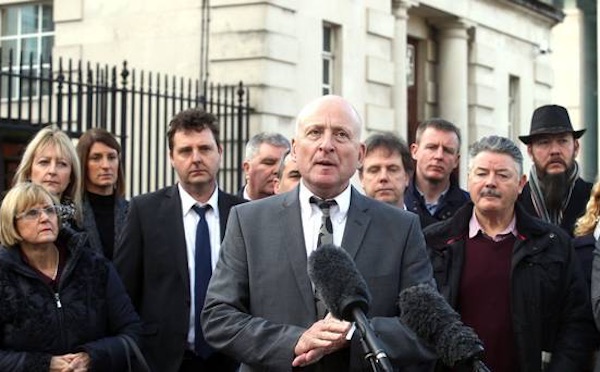
The PSNI is being ordered by a High Court judge to finalise and publish an all-encompassing report into suspected British state collusion with a loyalist unit behind more than 100 murders.
The judge, who has already ruled that the PSNI unlawfully frustrated any chance of an effective investigation, insisted on the completion of a thematic report into the so-called Glenanne Gang’s onslaught against nationalists throughout the 1970s.
Lawyers for the families of victims brought the action as it emerged that Mr Justice Treacy’s original verdict is set to be appealed.
Earlier this year the judge ruled that bereaved relatives were denied in their legitimate expectation that the result of an overarching investigation would be published.
In the High Court in Belfast on Tuesday, he said he would grant what is called “an order of mandamus” that compels the PSNI Chief to conduct a lawful investigation, and complete and publish the comprehensive thematic report.
He also said witnesses and those bereaved by the gang were dying without achieving any closure on suspected state collusion.
“The very sad inescapable fact is that while these debates rage on at huge public expense, the victims’ families languish with no end in sight and the ever increasing realisation that nothing much may happen in their lifetime,” he said.
Judicial review proceedings were brought in the name of Edward Barnard. Mr Barnard’s 13-year-old brother Patrick was among four people killed in a St Patrick’s Day bomb attack on the Hillcrest Bar in Dungannon in March, 1976.
Up to 120 murders in nearly 90 incidents in Mid Ulster and border areas are under scrutiny. They include outrages such as the 1975 Miami Showband Massacre, the Step Inn pub bombing in Keady, and the 1974 Dublin and Monaghan bombings.
Before drafting the terms of his order, the judge has given the PSNI a week to confirm that there are no minutes or documents about the decision not to complete the HET investigation.
Referring to the collusion allegations, he said: “I have no doubt that for some families their confidence has been undermined by delays which they believe are inimical to addressing their principal unresolved concerns.
“In the meantime witnesses or potential witnesses are lost and family members of the deceased die without any closure or resolution.”
The judge added: “Furthermore, the anxiety of the surviving family members is not only undimmed but exacerbated by the delays of a system that appears powerless to stop it.”
Sinn Fein’s Linda Dillon said it was a “hugely pivotal day” but criticised the PSNI for their legal blocking efforts.
“These kind of actions are undermining the confidence levels in the PSNI and new policing dispensation in the north,” she said.
“I am calling on the PSNI to comply with the judgement and provide the necessary resources and facilitate an effective and independent investigation so that the families can get access to truth and justice.”
Lawyer Darragh Mackin said it was a “landmark decision for the families of the Glenanne gang in their pursuit of justice”.
“Not only has the court confirmed that the decision not to investigate was unlawful but it has gone further to compel that such an investigation is now conducted in line with our clients’ expectation,” he said.
“We now urge the chief constable to put in place the mechanisms for such an independent investigation without any further delay.”
Eugene Reavey, whose three brothers were murdered by the Glenanne Gang in south Armagh in January 1976, said it was a “big day for us” and “a big help to all the legacy cases, not just Glenanne”.
![[Irish Republican News]](https://republican-news.org/graphics/title_gifs/rn.gif)
![[Irish Republican News]](https://republican-news.org/graphics/title_gifs/harp.gif)

